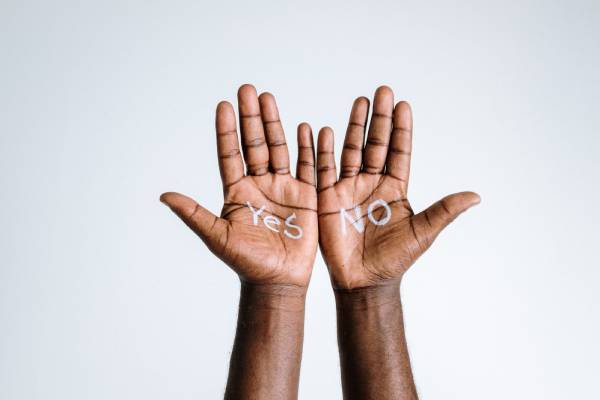
How often do you regret that instead of a firm “no”, you just were able to mumble: “Well, yes, of course I can”?
Then, of course, there was a goofy waste of time, missed opportunities, irritability and fatigue.
The inability to refuse brings confusion and torment to our lives because of the eternal question to ourselves: “Well, why do I take what I do not need again?
The difficulties with failure are different:
- fear of fault: I refuse, and they’ll be offended
- anxious attachment: I say no and I’ll be disliked
- dependence on someone else’s opinion: I refuse and they’ll think badly about me.
- “Good Man” syndrome: to refuse is rudely and impolitely
- self-doubt and doubt in people: I’m going to say no, and then they’re not going to help me either.
Each of them (listed problems) is a good reason to work with yourself. But our advice will not be superfluous, and even will help a lot.
- Take a break
You don’t have to give an instant answer. Don’t rush it. Even if the issue requires an urgent solution, you still have 5-10 seconds. This time is enough to calm the first altruistic impulse and call for the help of common sense. If the issue is not urgent, ask to wait till the evening. It’s better refuse later than to immediately agree and painfully regret it.
Self-therapy can be an essential tool for personal growth and self-improvement.
Browse through our courses and see the positive changes they can bring to your life.
You are not sure where to begin?
2. Substantiate
There’s a good reason behind your refusal. Just politely explain your “no”. But don’t start with words “Excuse me, but…”, because this enunciation is inviting the interlocutor to put pressure on you and quickly get consent. You’re protecting your time and your personal boundaries, so there’s nothing to apologize for.
3. Start with gratitude
If it’s very important for you to look polite and nice person, start your refusal with the words of gratitude for the trust. “Thank you, I’m very pleased that you have reached out to me, but ,unfortunately, in the next two weeks I will be very busy.”
4. Sympathize
Are you afraid of being thought as an insensitive and selfish person? Start your rejection with empathy. “Yes, it’s not easy for you now, so much has come on you. I’m really sorry, but I can’t do it, I already have plans that I can’t cancel.”
5. Train yourself
It is impossible for one day to turn from a reliable person into an iron and resilient one.
Saying “no” has to be gradually learned. Try to deny the little things first. ‘I can’t lend you my new dress – I’ll go to this party in it.’ “No, I can’t give you a ride home today – after work, I’m going on an urgent business.” If you learn to refuse on a minor occasion, it will be easier to say “no” in more serious situations.
Remember that adequate people normally perceive refusals and know how to build their lives so as not to die without someone’s help.